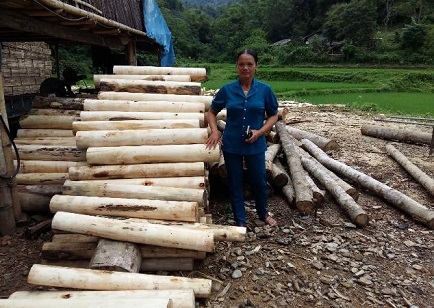Harvesting the fruits of collective action

- Ms. Hoang Thi Mai stands next to May Phay’s timber production
The case of the May Phay Collective Group, Bac Kan province, Viet Nam
Every day, Ms. Hoang Thi Mai, a Na Ca village member, heads to the May Phay Collective Group operation site, where she manages 16 members, a plywood workshop, vegetable plantations and small livestock.
Seven years ago, the May Phay Collective was a group of nine smallholder producers who had little idea of the potential of their land and collective strength. A lack of appropriate roads for timber transportation and limited knowledge on the calculation of timber volume were among the hurdles blocking the growth of May Phay. From 1993 to 2015, the group lived off a single source of income: unprocessed timber. Realizing the hidden possibilities for achievement of the group, Ms. Mai partnered with the Forest and Farm Facility (FFF) to ramp up their timber production and organizational strength.
Better organization for improved livelihoods
Bac Kan is a mountainous province in Northeast Viet Nam with one of the largest natural forest areas in the region, covering 95.3 percent of the territory. May Phay has been reaping the benefits of the province’s natural forests for the past 29 years – but it has not always been easy. For a long time, the members did not realize the abundance of planted forest wood in the locality and how to calculate timber volume for fair negotiation with local traders. They were often pressured to sell for very low prices and had to spend nearly 70 percent of their income on transportation costs due to a lack of roads leading to forests. In addition, raw timber was their only source of income – a risky situation considering the increasing volatility of weather phenomena and availability of natural resources.
To revert this situation, Ms. Mai led the group through a transformation process. The members took part in training sessions on market analysis and development as well as organizational management, inspiring them to restructure the group and tap into new markets. They selected seven new members and assigned a management board for better distribution of tasks and responsibilities based on the members’ skills. The group also registered as an official collective and now raises 1 million VND per member every year in membership fees. “The most important thing is the selection of members. They must unite and be enthusiastic, have common interests, be dynamic and proactive. In addition, you must have skilled workers to repair and adjust machinery and close cooperation with local partners,” stated Ms. Mai. “Before, they worked individually and sold their products to traders. Now they have a chance to access with information, techniques, exchange experiences and sell forest and farm products together with better prices and a stable market.”
With the improved structure, the collective group opened a plywood processing workshop. After visiting plywood processing models in Bac Giang and Phu Tho provinces, they raised VND 423 million for machinery and initial costs and mobilized local actors willing to donate land to build roads to the production areas. Over 3.5 km of roads have been constructed since, reducing transportation costs from 70 to 30 percent of their income.
Today, the workshop has an income of VND 150 000 to 200 000 per 1 block of wood and has created stable jobs for 14 local workers, of which 8 are women, with fixed incomes of 3 to 5 million VND per month.
Strategic connections for a strengthened safety net
The group also expanded their network and currently collaborates with 40 forest and farm producer households in the province. The new connections helped May Phay explore new value chains besides timber. Today, the collective manages over 100 ha of community forests and is involved in the production of green zucchini and pig raising, which are sold at local markets in Northern Viet Nam. “It is necessary to choose the right products while cooperating with locals and securing support of local authorities for the creation of a favourable environment for the collective groups to grow,” said Ms.Mai.
Indeed, the collective also took part in multistakeholder roundtables at the commune, district and provincial levels. They had a chance to present and address challenges as priorities, including limited capital for production, insufficient transportation structures, land use right certificates, pests and technical skills for more efficient production lines.
May Phay’s connections proved essential throughout the COVID-19 pandemic. With the closure of essential markets, the group rolled out a resilience plan to safeguard the livelihoods of its members. They reached out to external timber factories and identified alternative buyers, linking to stable markets for plywood in the Thai Nguyen and Bac Ninh provinces and contributing to poverty alleviation.
FFF International Conference in Viet Nam
As part of the FFF International Conference for Sharing and Learning with Forest and Farm Producer Organizations: Saving our Future, producer organizations, experts, and partners from over 30 countries visited the May Phay collective.
“The visit served as inspiration for other forest and farm producer organizations to invest in inclusive business models and value chain diversification. It showed how important it is for smallholder producers to unite for the benefit of members and their communities through the creation of jobs and reduction of poverty rates,” said Ms. Mai, “It was also important to increase the visibility of the collective’s work among local decision-makers.”
With its transformation, the May Phay collective group has demonstrated great potential of becoming a registered cooperative in the near future. “With appropriate policy support and continued engagement from our members, I believe we can do it,” said Ms. Mai at the visit.
